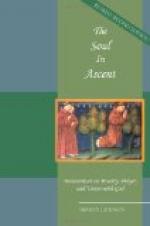Our souls have a right to be heard, and their prophecies have in them an element of certainty. He who listens to the voices which speak within will never believe that the death of the body is the end of his personal being. The suggestion of a state of existence from which sin, sorrow, and death shall be forever absent, into which there shall enter nothing that maketh a lie, and where sacrificial love is the everlasting light, is the highest and most satisfying ideal for human life that has ever been spoken or imagined; and that which completely satisfies the heart cannot at the same time be repudiated by the intellect.
Let us, therefore, reverently confess that we believe in “the life everlasting.”
PRAYERS FOR THE DEAD
Thy voice is on the rolling
air;
I hear thee
where the waters run;
Thou standest
in the rising sun,
And in the setting thou art
fair.
What art thou then? I
cannot guess;
But tho’
I seem in star and flower
To feel
thee some diffusive power,
I do not therefore love thee
less:
My love involves the love
before;
My love
is vaster passion now;
Tho’
mixed with God and Nature thou,
I seem to love thee more and
more.
Far off thou art, but ever
nigh;
I have thee
still, and I rejoice;
I prosper,
circled with thy voice;
I shall not lose thee tho’
I die.
—In Memoriam. Tennyson.
XI
PRAYERS FOR THE DEAD
The wisest of men have little to guide them when they approach that mysterious realm from which no traveler has ever returned. With humility and the consciousness that we must, at the best, walk in the twilight, I take up one of the most mysterious and fascinating of themes. No one has any right to speak positively on such a subject, and I shall not do so. Those who have the assurance of sight when they write about what lies beyond the grave are both to be envied and to be pitied,—envied because of their confidence, pitied because they may be self-deceived.




